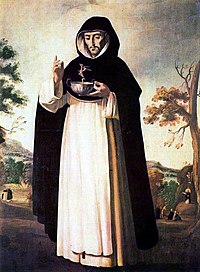San Luis Bertrán
| Saint Louis Bertrand | |
|---|---|

Spanish Baroque Oil painting of Louis Bertrand by Francisco de Zurbarán
|
|
| "Apostle of South America", religious, priest, missionary, confessor | |
| Born |
1 January 1526 Valencia, Spain |
| Died | 9 October 1581 (aged 55) |
| Venerated in | Roman Catholic Church |
| Canonized | 1671, Rome by Pope Clement X |
| Feast | 9 October |
| Patronage | Buñol; New Granada; Colombia |
St. Louis Bertrand, O.P. (Spanish: Luis Beltrán, Luis Bertrán) (1 January 1526 – 9 October 1581) was a Spanish Dominican who preached in South America during the 16th century, and is known as the "Apostle to the Americas". He is venerated as a saint by the Catholic Church.
Bertrand was born in Valencia to Juan Bertrand and Juana Angela Exarch. Through his father he was related to St. Vincent Ferrer, a thaumaturgus of the Dominican Order. At an early age he conceived the idea of becoming a Dominican Friar, and despite the efforts of his father to dissuade him, was clothed with the Dominican habit in the Convent of St. Dominic, Valencia on 26 August 1539. After the usual period of probation, he pronounced the evangelical vows.
He was grave In demeanour and apparently without any sense of humour, yet had a gentle and sweet disposition that greatly endeared him to those with whom he came in contact. While he could lay no claim to great intellectual gifts, he applied himself assiduously to study. In 1547 he was ordained to the priesthood by the archbishop of Valencia, St. Thomas of Villanova.
He was appointed to the office of master of novices in the convent at Valencia, the duties of which he discharged at different intervals for an aggregate of thirty years. When the plague broke out in Valencia in 1557 he devoted himself to the sick and dying; he prepared the dead for burial and interred them with his own hands.
When the plague had subsided, the zeal of the holy novice master sought to extend the scope of his already large ministry into the apostolate of preaching. Although it is said that "his voice was raucous, his memory treacherous, his carriage without grace", he became a fervent preacher. The cathedral and the most spacious churches were placed at his disposal, but they proved wholly inadequate to accommodate the multitude that desired to hear him. Eventually it became necessary for him to resort to the public squares of the city. It was probably the fame of his preaching that brought him to the attention of St. Teresa, who at this time sought his counsel in the matter of reforming her order.
...
Wikipedia
